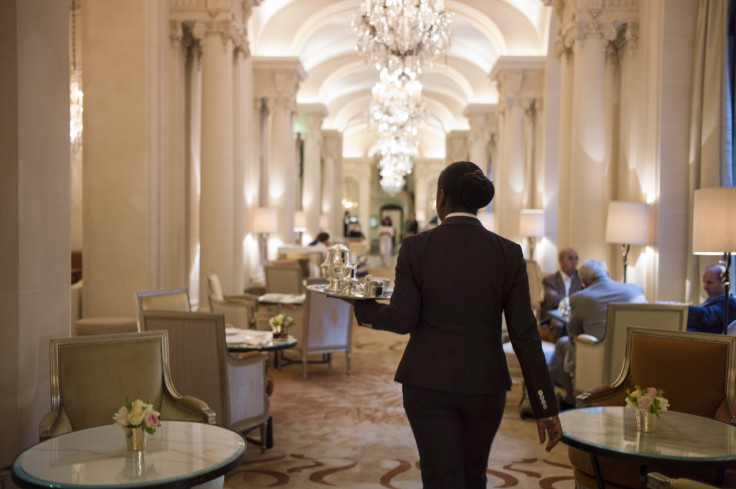'Tits make tips': Waitresses reveal the sexual harassment they face on a daily basis

KEY POINTS
- Waitresses allegedly harassed and groped at annual charity fundraiser.
- Lewd comments and groping the norm for women in hospitality industry.
The Presidents Club, a charity that counted politicians, businessmen and celebrities among its patrons, will close over allegations that waitresses were groped and sexually harassed at a men-only charity fundraiser.
But women who have worked in the hospitality industry have revealed that such behaviour comes as no surprise.
Undercover Financial Times reporter Madison Marriage was among the 130 waitresses hired for the event last week and claimed she was groped by diners.
Some male guests had asked other women to visit their rooms at the upmarket hotel, she added.
Waiting staff had to be "tall, thin and pretty" to be hired for the event and were ordered to wear black underwear and matching short skirts, according to the report.
Amid the uproar caused by the story, women who have worked in hospitality spoke out to say that the behaviour reported at the Presidents Club was appalling but not shocking.
Janine*, who is 27, worked as a bartender and waitress at a West End cocktail lounge and nightclub between 2011 and 2015. She told IBTimes UK: "I encountered verbal harassment more shifts than I didn't and often several times a night.
"It was very common, to the point where you become quite 'used to' it and it stops feeling shocking after a while.
It doesn't excuse any bad behaviour but our uniform policy probably didn't help matters
"Verbal abuse was the most common. I suspect this was because I worked behind the bar, which formed a kind of barrier against would-be gropers. It was often comments about my appearance and what male punters would 'like to do' to me. For example 'you've got a proper arse on you, I'd love a go on that'.
"However, when I did sub for waitresses on busy nights, it wasn't uncommon for punters to pinch my bum as I went past with a tray of drinks.
"It doesn't excuse any bad behaviour but our uniform policy probably didn't help matters as all female staff were required to wear bright red lipstick and mini-skirts, and our uniform shirts were very fitted.
"I witnessed a girl being asked not to wear a skirt to work again because it was too long and was once asked by a manager to drop a couple of shirt buttons because 'tits make tips'. I refused."
"Unfortunately, it doesn't surprise me at all," added Katie*, a 27-year-old woman who was a bartender and waitress for high-end restaurants, cocktail and wine bars that held private events in London.
"My customers in the bars I worked in were all older rich men who believed because they had the cash they could have anything from anyone they wanted," she told IBTimes UK.
"Sexual harassment was a daily occurrence and it was very common, to an extent expected," she said.
"The most extreme case I ever encountered was of an older gentleman grabbing me repeatedly, touching and stroking my bum, pulling me in by my waist while I had my hands full with glasses and plates and telling me all of the wonderful things he could buy me and the places he could take me if I went with him," she recalled.
Katie, who worked in the industry between 2011 and 2014, added: "Our uniform was provided and it was just a tight black top and a tight, short, black skirt so you are immediately objectified."
We were never told what to do in the event of experiencing sexual harassment
Asked whether they were encouraged to report harassment to senior members of staff or were aware of any complaints procedures, the women both said they did not believe that they would have been taken seriously.
"I did feel like I could tell my superior but I never thought very much would come of it. Either [the customer] would get a slap on the wrist or we would just be told to avoid them," Katie said.
"We were never told what to do in the event of experiencing sexual harassment. Everyone I know who has worked in hospitality has had similar experiences."
Janine said that while the door staff at the venue were "fantastic", "I'm not sure that we could have had anyone kicked out just for verbal comments."
Katie added: "The problem with events like this is it just fuels an ancient attitude and keeps it alive in our modern society and makes this sort of behaviour almost part of our culture where people still think it is acceptable."
*Names have been changed




















